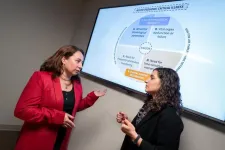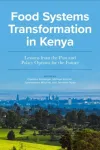(Press-News.org) Thanks to technological advances, scientists have access to vast amounts of data, but in order to put it to work and draw conclusions, they need to be able to process it.
In research recently published in Genome Biology, Rensselaer Polytechnic Institute’s Boleslaw Szymanski, Ph.D., Claire and Roland Schmitt Distinguished Professor of Computer Science and director of the Network Science and Technology Center, and team have found a method that effectively organizes and groups the data for a variety of applications. The process is referred to as clustering in machine learning.
The clustering method they devised, called SpeakEasy2: Champagne, was tested alongside other algorithms to analyze its effectiveness in bulk gene expression, single-cell data, protein interaction networks, and large-scale human networks data. Bulk gene expression tends to be tissue and disease specific with implications on function and phenotype, or how a genotype interacts with the environment. Single cell data is grouped according to a cell’s distinctions. Protein binding is a core mechanism for signal propagation in cells, and identifying proteins that assemble into complexes is useful for defining functions within a cell.
The team’s testing of SpeakEasy2: Champagne alongside other methods revealed that no single method is perfect for all situations, and the performance can vary. However, SpeakEasy2 performed well across different types of data, suggesting that it's an effective way to organize molecular information.
“We tested to determine if the methods worked well even if the data included a lot of irrelevant information and also new, unseen data,” said Szymanski. “We wanted to measure their reliability and performance in a number of ways, so we tested across a wide range of networks. SpeakEasy2: Champagne proved to have consistent and acceptable performance across diverse applications and metrics.”
“Optimizing machine learning methods to effectively integrate large amounts of noisy data is critical to advancing science across many research fields,” said Curt Breneman, Ph.D., dean of Rensselaer’s School of Science. “Dr. Szymanski’s work will allow new insights into cell function and gene expression and may illuminate new potential drug targets and their inhibitors to treat disease.”
This work was done in collaboration with Chris Gaiteri, Ph.D., of Rush University Medical Center and his team, and it is a result of a decade-long collaboration. Eight years ago, they collectively developed a novel clustering algorithm named SpeakEasy that, in light of vast new sources of biomedical data thanks to advances in computer science technologies, required more intelligent and faster software that will work for more diverse and greater amounts of biomedical data.
Gaiteri’s team includes David R. Connell; Faraz A. Sultan, M.D.; Artemis Latrou, Ph.D.; Bernard Ng, Ph.D.; Ada Zhang; and Shinya Tasaki, Ph.D.; all of whom contributed to the findings.
About Rensselaer Polytechnic Institute:
Founded in 1824, Rensselaer Polytechnic Institute is America’s first technological research university. Rensselaer encompasses five schools, over 30 research centers, more than 140 academic programs including 25 new programs, and a dynamic community made up of over 6,800 students and 110,000 living alumni. Rensselaer faculty and alumni include upwards of 155 National Academy members, six members of the National Inventors Hall of Fame, six National Medal of Technology winners, six National Medal of Science winners, and a Nobel Prize winner in Physics. With nearly 200 years of experience advancing scientific and technological knowledge, Rensselaer remains focused on addressing global challenges with a spirit of ingenuity and collaboration. To learn more, please visit www.rpi.edu.
Contact:
Katie Malatino
Senior Communications Specialist
malatk@rpi.edu
838-240-5691
For general inquiries: newsmedia@rpi.edu
Visit the Rensselaer research and discovery blog: https://everydaymatters.rpi.edu/
Follow us on Twitter: @RPINews
###
END
Researchers from the Harvard John A. Paulson School of Engineering and Applied Sciences (SEAS) have developed a new lithium metal battery that can be charged and discharged at least 6,000 times — more than any other pouch battery cell — and can be recharged in a matter of minutes.
The research not only describes a new way to make solid state batteries with a lithium metal anode but also offers new understanding into the materials used for these potentially revolutionary batteries.
The research is published in Nature Materials.
“Lithium metal anode batteries are considered the holy grail ...
Andalibi To Receive Funding For Perthera Tissue Bank
Ali Andalibi, Senior Associate Dean, College of Science, is set to receive funding for: "Perthera Tissue Bank."
FFPE samples from Perthera will be housed in the cold room in the Institute for Advanced Biomedical Research (IABR). The Principal Investigator, Co-Investigator, and the staff member will be checking on the samples on a regular basis to ensure that the samples are safely stored and that the storage conditions, such as temperature, are appropriate. ...
In the ongoing biodiversity crisis, large terrestrial animals are more threatened by extinction than any other group of organisms. The African continent holds an impressively intact large-mammal community, but there is still a lot we do not know about how these species evolved, became diverse and adapted to the changing climate and habitats. Many of these questions can be addressed by investigating the genomes and genetic variation across species.
New research, published in Nature Communications, uses genomics to answer ...
(MEMPHIS, Tenn. – January 05, 2023) St. Jude Children’s Research Hospital investigators collaborated with a global group of acute pediatric critical illness experts to reach a consensus definition of the condition. Research on how to improve care in low- and middle-income countries has been stymied because conventional pediatric critical illness definitions are not applicable in these settings. The new, more universal definition, reached by consensus among researchers and clinicians from 40 countries, will enable scientists to study pediatric critical illness more universally, which should lead to improvements in patient outcomes ...
The past few years have seen Kenya, along with many other countries, confronted with multifaceted and compounding challenges. The disruptions caused by COVID-19, high levels of food price inflation, and environmental crises, such as locust infestations and droughts, have severely tested the resilience of Kenya’s food systems and the affordability of food for its citizens. Against this backdrop of challenges and ongoing demographic shifts, urbanization, and stagnating agricultural production, ...
Irvine, Calif., Jan. 8, 2024 — Additional staffing alone will not be sufficient to bridge the quality-of-care and health outcome disparities among nursing home facilities with varying percentages of residents with dementia, according to a first-of-its-kind study led by the University of California, Irvine. Specialized training, an easy-to-navigate environment and staff stability are also critical to meeting the unique challenges presented by this population.
The findings, recently published online in the journal Health Services Research, indicate that increased staffing generally improves outcomes for all patients but that at any given level of staffing, discrepancies ...
Frequent visits to oil palm plantations are leading to a sharp increase in mortality rates among infant southern pig-tailed macaques (Macaca nemestrina) in the wild, according to a new study published in Current Biology. In addition to increased risk from predators and human encounters, exposure to harmful agricultural chemicals in this environment may negatively affect infant development.
In wild populations, infant survival is crucial for determining individual fitness and for maintaining viable populations in changing environments. For primates, ...
JACKSONVILLE, Florida — New research from Mayo Clinic suggests that artificial intelligence (AI) could improve the diagnosis of peripartum cardiomyopathy, a potentially life-threatening and treatable condition that weakens the heart muscle of women during pregnancy or in the months after giving birth. Researchers used an AI-enabled digital stethoscope that captures electrocardiogram (ECG) data and heart sounds to identify twice as many cases of peripartum cardiomyopathy ...
The joint funding program of the French National Research Agency (ANR) and the German Research Foundation (DFG) promotes Franco-German cooperation in the natural sciences, the life sciences, and the engineering sciences. Through this program, Johannes Gutenberg University Mainz (JGU) will receive support for two distinctive projects in the field of biology.
The EVOMET project: Uncovering the evolution of metabolism in plants
Tomatoes, cucumbers, and potatoes taste different due to the accumulation ...
ITHACA, N.Y. – Whirligig beetles, the world’s fastest-swimming insect, achieve surprising speeds by employing a strategy shared by speedy marine mammals and waterfowl, according to a new Cornell University study that rewrites previous explanations of the physics involved.
The centimeter-long beetles can reach a peak acceleration of 100 meters per second and a top velocity of 100 body lengths per second (or one meter per second).
Not only do the results explain the whirligig’s Olympian speeds, but they also offer valuable insights for bio-inspired designers of near-surface water robots and uncrewed boats.
Until ...





